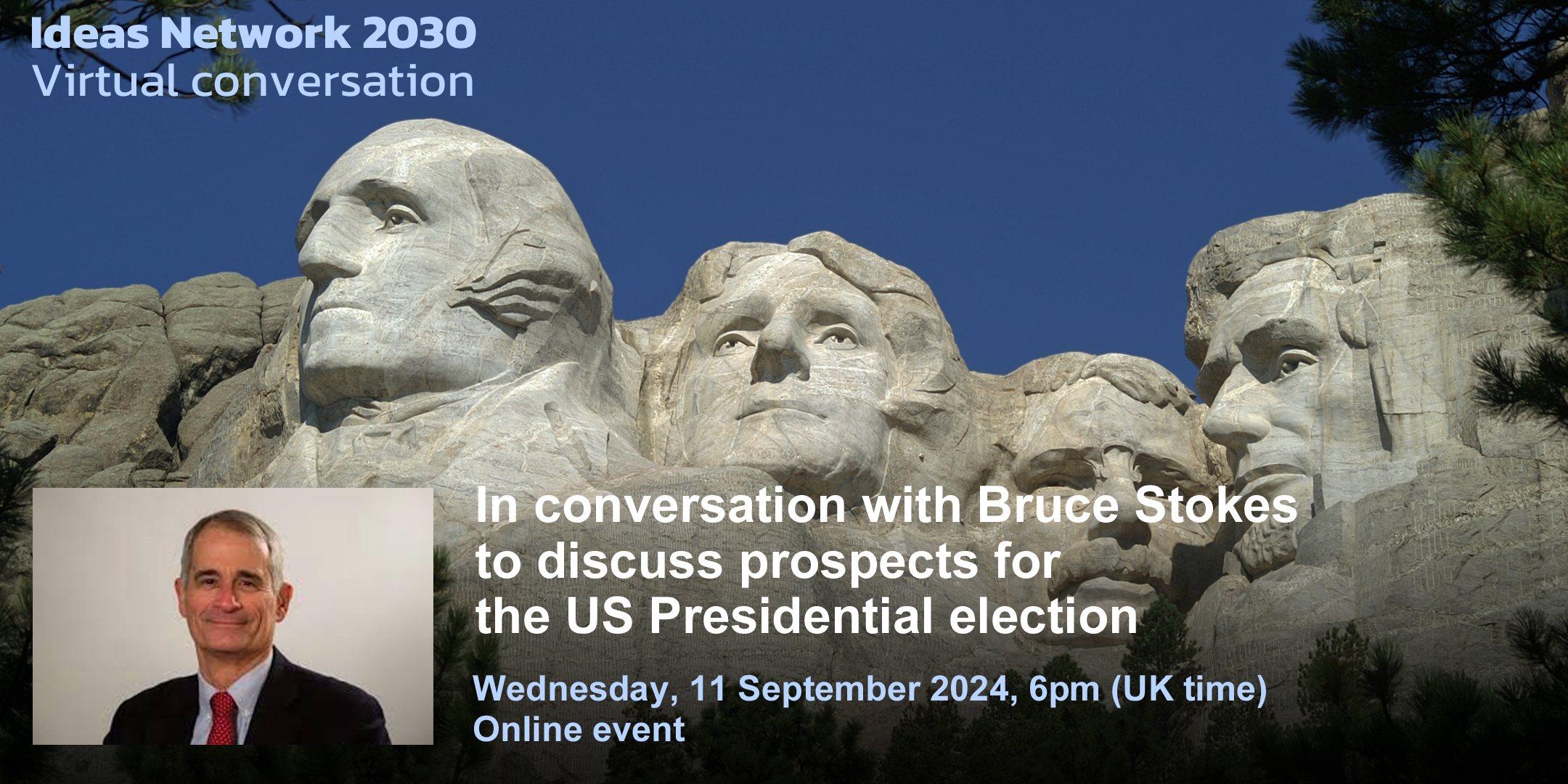
Wednesday, September 11, 2024
VIRTUAL CONVERSATION
Prospects for the US Presidential election
Speaker: Bruce Stokes, Visiting Senior Fellow, German Marshall Fund of the United States
Moderator: Alex Boyd, Director, Ideas Network 2030.
> Introduction
> AI summary of event
> Meeting videos
> Slides
> Speakers bios
Introduction
2024 is an exceptional year for elections during which more than 50 countries will be going to the polls. We were fortunate enough to have the insight of Klaus Welle earlier on in March setting out his in-depth analysis of the EU Elections ahead. Since then, we have had our elections in the UK in July. Now, in early November, the US Presidential election will take place which is looking to be once again a close run race. Bruce Stokes gave us a detailed analysis of the main themes under discussion looking at the critical factors which will be involved in determining the outcome. The result of the election will have a fundamental effect as to how the Western Alliance shapes up towards 2030.
AI summary of the virtual conversation
Here’s a summary of the key points from the discussion about the 2024 U.S. presidential election:
1. Current state of the race:
– The election is very close, with polls showing a tight race between Kamala Harris and Donald Trump.
– Only a handful of swing states will likely determine the outcome.
– Harris performed well in the recent debate, which may help shore up her support.
2. Key issues and voter sentiments:
– The economy and inflation remain major concerns for voters.
– Foreign policy is not a top priority for most Americans, but there’s a general desire to avoid foreign conflicts.
– Support for Israel has declined, especially among younger voters, which could impact turnout in some states.
– The country remains deeply polarized on many social and political issues.
3. Voter demographics and trends:
– Trump’s support is strongest among white men without college degrees and older voters.
– Harris has strong support from Black voters, highly educated voters, and young people.
– Young voter turnout remains a challenge for Democrats.
4. Campaign strategies and challenges:
– Harris is trying to appeal to rural voters to reduce Trump’s margins in those areas.
– Trump continues to energize his base with populist and “America First” rhetoric.
– The impact of celebrity endorsements (e.g. Taylor Swift for Harris) is uncertain but could help with youth turnout.
5. Potential wildcards:
– Late-breaking events or scandals could still impact the race, though their effect may be limited.
– The state of the economy in the final months could influence voters.
– Unforeseen global events (e.g. conflicts) might shift the narrative.
6. Long-term concerns:
– There are worrying signs about the health of American democracy, with significant portions of voters supporting major changes to the system or even authoritarian leadership.
– The deep polarization and distrust in institutions pose challenges regardless of who wins in 2024.
The speaker, Bruce, believes Harris has a chance to win but acknowledges the race remains very close and unpredictable. He emphasizes the importance of turnout and performance in key swing states as being crucial to the outcome.
Meeting videos
Click above to watch Alex Boyd’s introduction (3.5 min video).
Click above to watch Bruce Stoke’s presentation (23 min video).
Click above to watch the Q&A session (35 min video).
Slides

To access the slides from the Virtual Conversation click here.
Speakers bios

Bruce Stokes is a visiting senior fellow at German Marshall Fund of the United States (GMF). He is the co-author of GMF’s two recent studies on rebuilding Ukraine and senior editor of the 2022 Transatlantic Trends survey. From 2019 to 2021, he was the executive director of GMF’s Transatlantic Task Force, which produced “Together or Alone? Choices and Strategies for Transatlantic Relations for 2021 and Beyond”. He was also a GMF senior fellow from 2010 to 2012, wrote the 2009 Transatlantic Trends survey, and authored two GMF task force reports, “The Case for Renewing Transatlantic Capitalism”, and “A New Era for Transatlantic Trade Leadership”.
Bruce was a senior fellow at the Council on Foreign Relations between 2017 and 2020, and remains a member. He is also an associate fellow at Chatham House. From 2012 to 2019 he was the director of Pew Research Center’s Global Economic Attitudes and coauthored numerous public opinion surveys. Prior to this, he was for 23 years the international economics correspondent for the National Journal, a Washington, DC-based public policy magazine.
Bruce was a Japan Society Fellow in 1987 and 1989, living in and reporting from Japan. He was a member of President Clinton’s Commission on United States-Pacific Trade and Investment Policy in 1997 and wrote its final report, “Building American Prosperity in the 21st Century”. He is coauthor of “America Against the World: How We Are Different and Why We Are Disliked” and author of “Helping Ourselves: Local Solutions to Global Problems”. He edited “Partners or Competitors”, “Trade Strategies for a New Era”, and “Open For Business: Creating a Transatlantic Marketplace”.
Bruce was honored in 2006 by the Coalition of Service Industries for his reporting on services issues. In 2004, he was chosen by International Economy magazine as one of the most influential China watchers in the US press. In 1995, he was picked by Washingtonian Magazine as one of the “Best on Business” reporters in Washington, and, in 1989, he won the coveted John Hancock award for excellence in business and economics reporting for his series on the impact of the rising yen on the Japanese economy.
Bruce is a graduate of Georgetown University’s School of Foreign Service and Johns Hopkins University’s School of Advanced International Studies. He attended Columbia University’s Graduate School of Journalism.

Alex Boyd is a Director at Strand Partners, a consultancy based in London. He formerly worked as a senior civil servant and special adviser in UK Government as well as in the European Parliament. Alex is also a Director of the Ideas Network 2030.